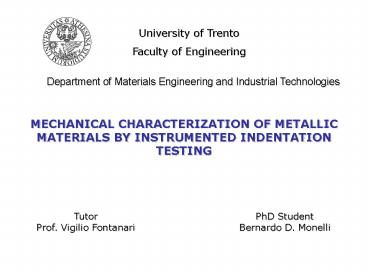University of Trento - PowerPoint PPT Presentation
1 / 12
Title:
University of Trento
Description:
Department of Materials Engineering and Industrial Technologies ... A spherical indenter (WC-Co) is slowly pushed against the sample which has to be ... – PowerPoint PPT presentation
Number of Views:92
Avg rating:3.0/5.0
Title: University of Trento
1
University of Trento Faculty of Engineering
Department of Materials Engineering and
Industrial Technologies
MECHANICAL CHARACTERIZATION OF METALLIC MATERIALS
BY INSTRUMENTED INDENTATION TESTING
Tutor Prof. Vigilio Fontanari
PhD Student Bernardo D. Monelli
2
Introduction Experimental Part Procedure FE
Model Conclusions
PROBLEM DEFINITION
- small amount of material is available
- destructive testings have to be avoided
- coating characterization
The elastic-plastic stress strain-curve (s-e) of
metallic materials cannot be determined by
standard tensile test
AIM OF THE WORK
Evaluation of stress-strain curve of metallic
material by instrumented spherical indentation
testing
Bernardo D. Monelli
University of Trento
3
Introduction Experimental Part Procedure FE
Model Conclusions
PROBLEM DEFINITION
- Spherical indentation test
L h curve
- Evaluation procedure of stress-strain curve
- Numerical simulation of spherical indentation
test
FE model
- Experimental and numerical results
- Conclusions
Bernardo D. Monelli
University of Trento
4
Introduction Experimental Part Procedure FE
Model Conclusions
Spherical Indentation Test --- L-h curve
A spherical indenter (WC-Co) is slowly pushed
against the sample which has to be tested
L h curve
h
sample
- L load applied to the indenter
- h cavity depth
Bernardo D. Monelli
University of Trento
5
Introduction Experimental Part Procedure FE
Model Conclusions
Spherical Indentation Test --- L-h curve
Material Al alloy Indenter diameter 2.5 mm
Bernardo D. Monelli
University of Trento
6
Introduction Experimental Part Procedure FE
Model Conclusions
s - e evaluation procedure
- Experimental evaluation of L h curve
- Costitutive law assumption
- Numerical evaluation of L h curve
- Comparison between the two curves
- (L2 Norm)
Bernardo D. Monelli
University of Trento
7
Introduction Experimental Part Procedure FE
Model Conclusions
- Model details
- Two-dimensional axi-symmetric model (four node
structural elements) - Isotropic and homogeneus material
- Indenter Tungsten carbide (E2630 GPa, n0.22)
- Indenter radius 1.25 mm
- Contact surface to surface elements
- Frictionless contact
Bernardo D. Monelli
University of Trento
8
Introduction Experimental Part Procedure FE
Model Conclusions
Material Al alloy Indenter diameter 2.5 mm
Bernardo D. Monelli
University of Trento
9
Introduction Experimental Part Procedure FE
Model Conclusions
sy Yield stress
n strain-hardening coefficient
Bernardo D. Monelli
University of Trento
10
Introduction Experimental Part Procedure FE
Model Conclusions
Material Ti Alloy
E1 ? 110 GPa
s ? 1000 MPa
n 0.1
Bernardo D. Monelli
University of Trento
11
Introduction Experimental Part Procedure FE
Model Conclusions
Conclusions
- The stress-strain of metallic materials can be
reasonably deduced from - the spherical indentation testing.
- The iterative procedure based on FE modelling of
spherical indentation testing - can carefully predict the stress-strain curves
of metallic materials.
- Hollomons power law can be used to represent
stress-strain curves for - some metallic materials (Ti-Alloy).
Future works
- Which is the rule played by material properties
(anisotropy, texture,)?
- Is there a relationship between the state of
surface (i.e. roughness and residual - stresses) and L-h experimental curve?
Bernardo D. Monelli
University of Trento
12
University of Trento Faculty of Engineering
Department of Materials Engineering and
Industrial Technologies
MECHANICAL CHARACTERIZATION OF METALLIC MATERIALS
BY INSTRUMENTED INDENTATION TESTING
Tutor Prof. Vigilio Fontanari
PhD Student Bernardo D. Monelli































